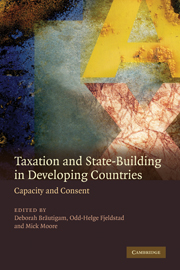Book contents
- Frontmatter
- Contents
- List of figures and tables
- List of contributors
- Acknowledgements
- 1 Introduction: taxation and state-building in developing countries
- 2 Between coercion and contract: competing narratives on taxation and governance
- 3 Capacity, consent and tax collection in post-communist states
- 4 Taxation and coercion in rural China
- 5 Mass taxation and state–society relations in East Africa
- 6 Contingent capacity: export taxation and state-building in Mauritius
- 7 Tax bargaining and nitrate exports: Chile 1880–1930
- 8 Associational taxation: a pathway into the informal sector?
- 9 Rethinking institutional capacity and tax regimes: the case of the Sino-Foreign Salt Inspectorate in Republican China
- 10 Tax reform and state-building in a globalised world
- References
- Index
3 - Capacity, consent and tax collection in post-communist states
Published online by Cambridge University Press: 22 September 2009
- Frontmatter
- Contents
- List of figures and tables
- List of contributors
- Acknowledgements
- 1 Introduction: taxation and state-building in developing countries
- 2 Between coercion and contract: competing narratives on taxation and governance
- 3 Capacity, consent and tax collection in post-communist states
- 4 Taxation and coercion in rural China
- 5 Mass taxation and state–society relations in East Africa
- 6 Contingent capacity: export taxation and state-building in Mauritius
- 7 Tax bargaining and nitrate exports: Chile 1880–1930
- 8 Associational taxation: a pathway into the informal sector?
- 9 Rethinking institutional capacity and tax regimes: the case of the Sino-Foreign Salt Inspectorate in Republican China
- 10 Tax reform and state-building in a globalised world
- References
- Index
Summary
Introduction
This chapter investigates post-communist state-building through an examination of tax collection. I seek to explain divergences in outcomes between the post-communist states of East Central Europe (ECE) and those of the former Soviet Union (FSU). While post-communist states in each region begin from similar starting points, they end up on different developmental paths. Compared to the states of the former Soviet Union, the East Central European states exhibit more democratic decision-making, more progress in developing efficient administrative capacity and greater societal consent. Focusing on the revenue bargains that were forged in response to the fiscal and political crises that unfolded in the early transition period, I explain how political battles over the creation of new tax regimes contributed to these differing outcomes. These revenue bargains became an enduring influence on the development of capacity and consent in the post-communist states. The Polish and Russian experiences illustrate the contrasting paths of ECE and FSU countries to post-communist state-building. I distinguish three sequential processes in the construction of a new tax regime: the making of revenue bargains as part of the establishment of new tax regimes; the effects of these revenue bargains on capacity to collect tax; and, the eventual remaking of revenue bargains in order to carry out tax reform. I conclude with a brief discussion of the larger political implications of revenue bargains and tax collection for post-communist state-building.
- Type
- Chapter
- Information
- Taxation and State-Building in Developing CountriesCapacity and Consent, pp. 64 - 88Publisher: Cambridge University PressPrint publication year: 2008
- 6
- Cited by



